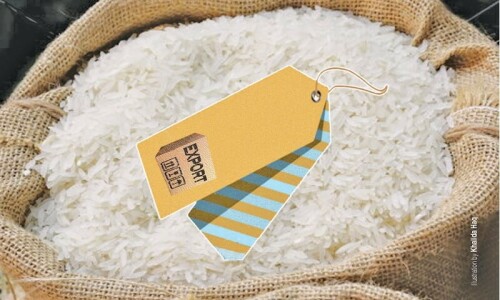ISLAMABAD: The country is confronting its highest-ever inflation, but the Ministry of Commerce said on Tuesday that raw food exports increased by 37 per cent in FY24 over the preceding fiscal year.
The value of raw food exports reached $8 billion in 2023-24, up from $5.8bn over the corresponding period last year, according to the data compiled by the Trade Development Authority of Pakistan (TDAP).
As a result, consumers across the country are paying higher prices for food items because of supply and demand gaps. Raw food exports have climbed for 11 consecutive months in the outgoing fiscal year despite the highest food inflation in history.
Rice exports increased substantially by 78.26pc to $3.8bn during FY24 compared to $2.17bn in FY23.
This surge is attributed to Pakistan’s strong performance in the EU, Africa, the Asean region, and GACC countries, coupled with fixing the Minimum Export Price and enhanced compliance with Sanitary and Phytosanitary standards.
Massive shipments of rice, vegetables, meat etc fetch $8bn in FY24
India’s decision to ban rice exports to protect the interests of domestic consumers has emerged as a key driver behind the surge in basmati rice exports from Pakistan.
At the same time, India imposed a ban on the private sector’s export of non-basmati rice and a 20pc export tariff on parboiled rice to tame inflation, which proved a bonanza for Pakistan’s non-basmati rice exports.
Due to a sustained surge in export figures over the past two years, the average price of basmati rice has surged to Rs400 per kg from Rs150, restricting buying from domestic consumers.
Meat exports increased 17.66pc to $ 507 million in FY24, compared to $431m in the corresponding period of the previous year.
The opening of new markets, participation of new companies in meat exports, and approvals for additional slaughterhouses have contributed to this growth.
Meat prices in the domestic market have experienced an unparalleled surge in recent years. In two and a half years, the average price of buffalo meat has jumped from Rs700 per kg to Rs1,300.
This increase has caught the attention of market observers and stakeholders alike. The price of chicken has also experienced an unprecedented surge, reaching its highest level over the last two years.
The export of sesame seeds has seen remarkable growth, reaching $410m in FY24 compared to $151m in the corresponding period of the previous year, marking a positive growth of 171pc.
Increased production in 2023 and higher demand from countries like China, South Korea, and Japan have been key factors driving this growth.
Maize exports surged 121pc to $421m in FY24, compared to $190m in the preceding year.
Rising global food commodity prices following the outbreak of the Russian-Ukraine war contributed to this significant increase. Major markets for Pakistani maize include Vietnam, Malaysia, South Korea, and Oman.
Onion exports surged 4,024pc, or almost 42 times, to $224m in FY24 compared to $5.4m in FY23 while the exports of mangoes also increased by 12.74pc. Additionally, exports of spices increased by 7.8pc and 7.8pc, respectively, in the outgoing fiscal year.
TDAP Chief Executive Zubair Motiwalla has said that with the help of relevant stakeholders, the authority is constantly trying to address supply chain issues in the agro sector. He said the opening of the Chinese market for Pakistani meat has created an opportunity to enhance Pakistan’s share in this market. For the first time, Pakistan has exported cherries to China.
Similarly, a recently approved legislation allows the export of inland fisheries (aquaculture). He said that with this level of growth, we can achieve the $10bn target in 2024-25.
Published in Dawn, July 3rd, 2024













































Dear visitor, the comments section is undergoing an overhaul and will return soon.